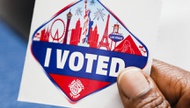You’ve heard of Iowa’s coin toss. Well, Nevada uses a card draw. In the event of a tie between presidential candidates at a caucus site, Democrats bust out a good, old-fashioned game of “pick a card, any card,” just as a gambling state should.
Caucuses serve two functions: to express preference for a presidential candidate, and to elect delegates to attend county, state and finally national conventions, where parties determine official nominees. Democratic and Republican caucuses in Nevada take place February 20 and 23, respectively, and are the only chance for voters to help determine who represents their party.
Republican caucuses choose delegates before casting confidential paper ballots, but during a Democratic caucus, voters show up and stand in a space that indicates their presidential preference. Each of those Democratic groups is awarded delegates based on “caucus math,” and if two groups tie for the loss or gain of a delegate, they can turn to the cards—specifically, an unwrapped deck provided by the state party, to be shuffled seven times before use. If both groups pull cards of the same rank, the game defaults to suit, spade being the highest, then hearts, diamonds and clubs. If both parties pull the same rank and suit, well … there’s a problem.
During the 2008 caucus, then-Sens. Barack Obama and Hillary Clinton tied in two Northern Nevada precincts, and Obama won both draws. Will the Dems call on a game of chance this time around? We’ll soon find out.






